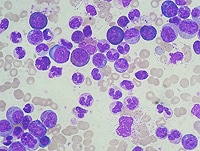One thing is for sure: current clinical practice of Oncology is miles away from the cutting edge science advancing before it and there is a reason to this fact, only what is clearly established and approved by national institutions reaches the practicing Oncologist. And clearly, it is important that speakers during Oncology conferences reinvent themselves deep enough to understand the flow of information coming through. It is easy to tell who knows fully and who is trying to keep up among speakers. Navigating the world of research while keeping up with clinical studies is the challenge our speakers face.
1. In lung cancer
-------------------
*In Adenocarcinoma: Pemetrex +Cisplatin based treatment is still King prior to gene Mutation determination, in Metastatic setting and first line
*But when EGFR and positive is known, Erlotinib came on top! And when progression occurs,
continuing ERLOTINIB, but adding a chemotherapy doublet won!
*Despite great achievements by Target therapy in lung cancer, most of the time it is hard to prove survival benefits because most studies allow cross-over of those failing the chemotherapy-alone arm.
*Afatinib was superior to Cisplatin-Pemetrex in those with Del 19/L858R (EGFR mutation positive)
with Progression free survival 13.6 months Vs 6.9 months in metastatic setting.
*Increasingly, re-biopsy at recurrence is occurring to reassess the status of common Mutations.
It has noted that tumors which were EGFR positive, once they become resistant, they adopt small cell features and respond to Small cell regimens.
* When using a EGFR, continue the drug beyond resistance because in a limited MSKCC series, up to 25% of cancers experience a "FLARE" when TKI (Tyrosine Kinase Inhibitors) were discontinued. So, while considering options for 2nd line therapy, do not stop TKI.
*Currently tested Mutations:
EGFR, EML4-ALK fusion, MET amplification by FISH (not so much by IHC), ROS-1, PIK3CA (sometime FGFR1)
*"PROXIMITY" TO ROS1 WITH INSULIN RECEPTOR discussed
*IF EGFR positive, rarely you will find KRAS (exclusivity rule discussed)
*in lung cancer :
you find ROS1 in 1.5% of cases,
ALK + in 5% of cases
RET + in 2% of cases
EGFR + in 18% of cases
HER-2 in 2 % of cases
*Acinar Morphology a cue for ALK positive? and CRIZOTINIB is the answer!
*Now comes OR HAS ARRIVED THE PRACTICE OF "MULTIPLEX TESTING" FOR IDENTIFICATION OF SPECIFIC MUTATIONS.
*Of note: the study showing Taxotere equivalent to Gefitinib in lung cancer cases unscreened for EGFR mutation at onset of trial are challenging the notion of Early EGFR identification!
NEW GANETESPID (+TAXOTERE), THIS IS AN INHIBITOR OF HSP90, A CHAPERONE MOLECULE AND PD-L1 BMS936558
WITH THIS FRAME OF INFORMATION - GO TO WORK!
NEXT: METASTATIC MELANOMA
A blog about research, awareness, prevention, treatment and survivorship of Breast Cancer and all cancers, including targeted scientific research and a grassroots approach to increase screening for cancer, especially in the low income and under-insured population of El Paso, Texas, with a view to expand this new health care model to many other 'minority' populations across the United States and beyond
Showing posts with label TKI. Show all posts
Showing posts with label TKI. Show all posts
Saturday, March 9, 2013
Thursday, December 27, 2012
Teva Oncology is excited to announce FDA approval of SYNRIBO™ for
Injection
for the treatment of adult patients with chronic or accelerated phase chronic
myeloid leukemia (CML) with resistance and/or intolerance to two or more
tyrosine kinase inhibitors (TKIs). This indication is based upon response rate. There are no trials verifying an improvement in disease-related symptoms or increased survival with SYNRIBO.
for the treatment of adult patients with chronic or accelerated phase chronic
myeloid leukemia (CML) with resistance and/or intolerance to two or more
tyrosine kinase inhibitors (TKIs). This indication is based upon response rate. There are no trials verifying an improvement in disease-related symptoms or increased survival with SYNRIBO.
Indication
- SYNRIBO is indicated for the treatment of adult patients with chronic or accelerated phase chronic myeloid leukemia (CML) with resistance and/or intolerance to two or more tyrosine kinase inhibitors (TKIs). This indication is based upon response rate. There are no trials verifying an improvement in disease-related symptoms or increased survival with SYNRIBO.
- ===========================================================
- for more info, go to the site!
Saturday, December 15, 2012
Ponatinib in CML
Drug & Reference Information
Ponatinib is approved for use in patients with chronic myeloid leukemia (CML) and also Philadelphia chromosome–positive (Ph+) acute lymphoblastic leukemia (Ph+ ALL) who have relapsed or are refractory to other therapies. Many of these patients, but not all, have developed a T3151 mutation, which makes the disease resistant to the standard treatment with tyrosine kinase inhibitors (TKIs) such as imatinib ( Gleevec).
"The approval of ponatinib is important because it provides a treatment option to patients with CML who are not responding to other drugs, particularly those with the T3151 mutation who have few therapeutic options," said Richard Pazdur, MD,
Subscribe to:
Comments (Atom)
